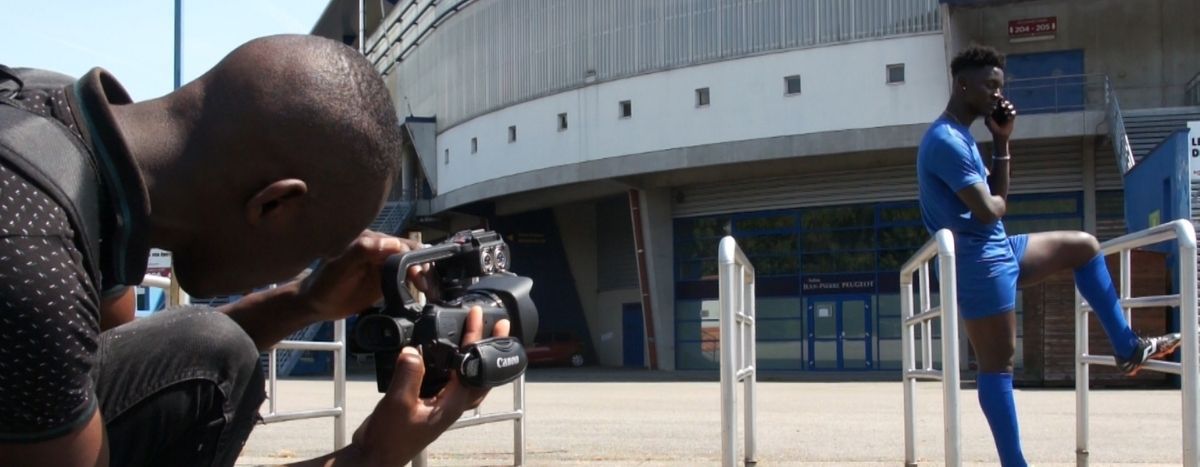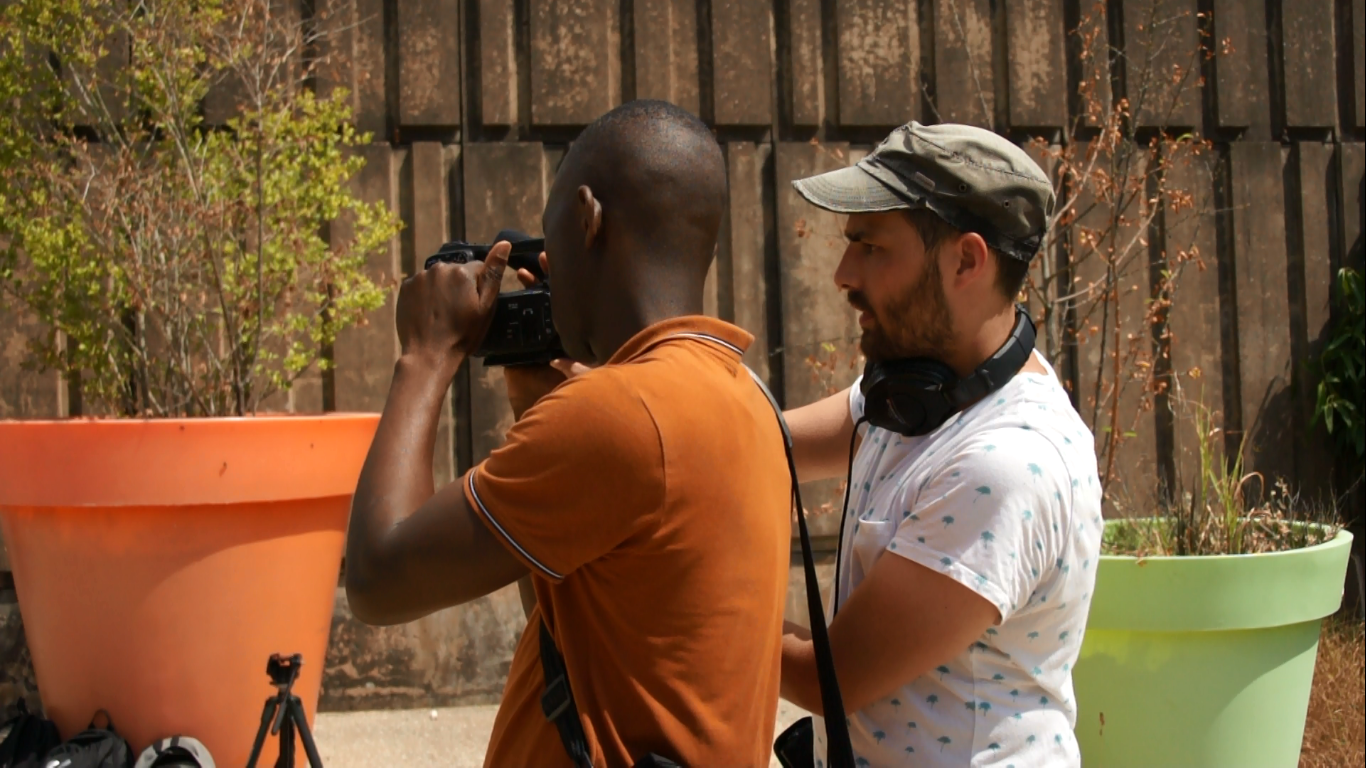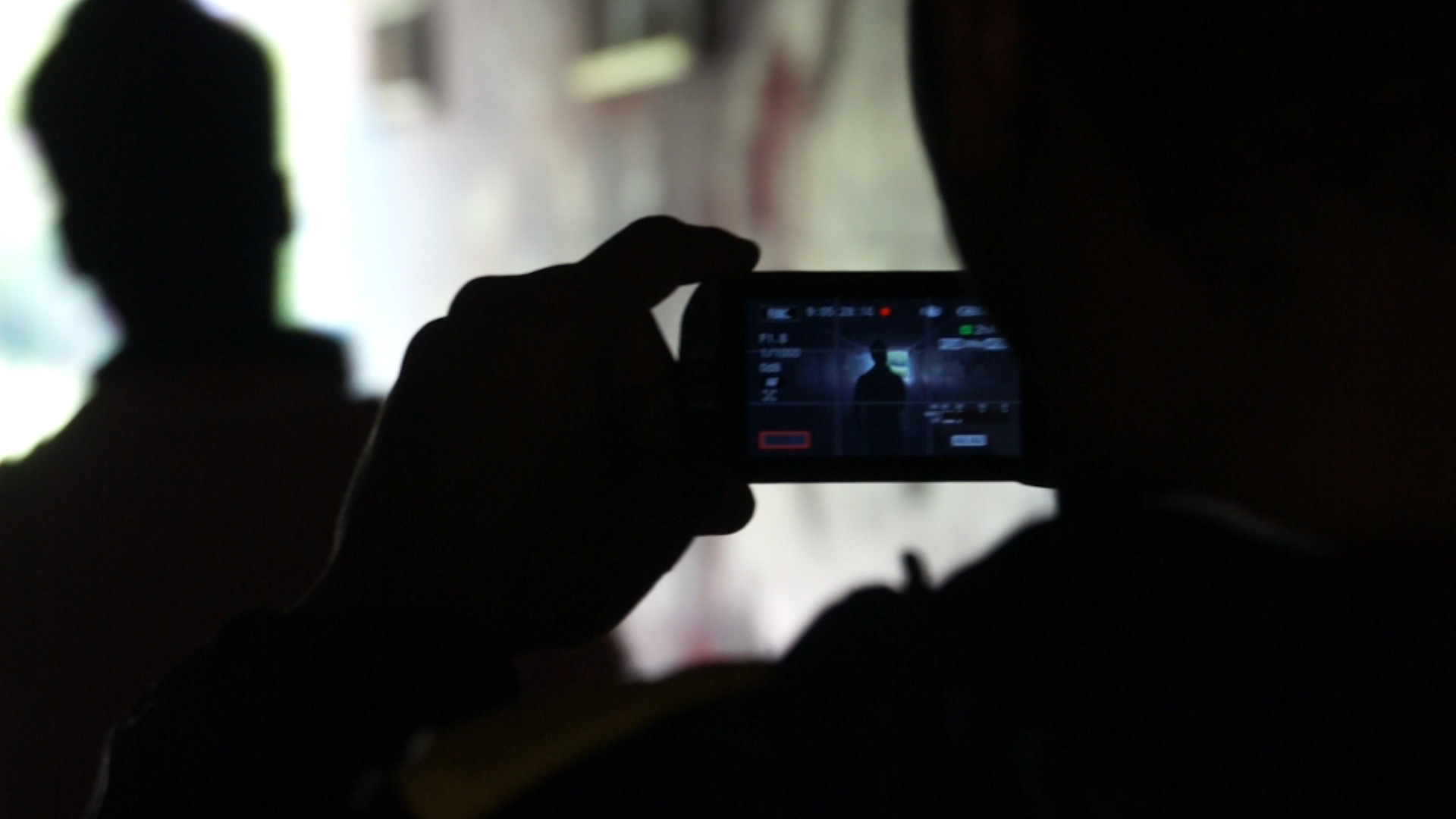
In France young refugees are using film as a form of self-expression
Published on
Translation by:
 Anonymous
Anonymous
A youth centre in the small town of Montbéliard has teamed up with a film director to give five unaccompanied refugee minors the chance to make their own AV project. These adolescents have faced all kinds of difficulties in their lives so far, and the experience of making a film has provided an important opportunity for them to express their feelings.
It's a Saturday afternoon at the music school in Montbéliard, a town in the administrative region of Bourgogne-Franche-Comté, and Joël and Mohamed are trying out a rhythm on the drums. A few feet away Silvestre is recording another boy, Williams, while he tries to layer some vocals over a backing track. Williams has written a song and they're all working together to try and record the best version possible. Joël and Mohamed are particularly enthusiastic about the instruments around them. Together, the boys must complete the soundtrack to the video they're in the process of making alongside the director Fabien Guillermont. They started this project in June, as part of their participation in a visual arts awareness workshop. Now it has turned into a full-fledged film.
Joël, Mohamed, Silvestre and Williams have been living in France for roughly a year. They are unaccompanied minors with refugee backgrounds and they have no legal guardians. When they arrived in France, the boys were sent to the Doubs department (an administrative level of government in France), where they were subsequently taken into the care of Grange la Dame, a child protection centre in Montbéliard. This establishment is responsible for 70 young people, including refugees and others that are eligible for social support. There are currently 40 people at the centre who fit into the former category. They are all male, and they all come from sub-Saharan Africa. In 2019, 16,760 unaccompanied minors arrived in France. 95% of them were boys aged between 15 and 18 years old.
As the number of people arriving has increased, so too has the problem of stereotyping. Given that unaccompanied minors tend to congregate in large cities, and that they often suffer from various kinds of emotional, social, and economic instability, many in this demographic eventually find themselves in tension with the authorities. This is a complex issue, and the specific profile varies from person to person. In the media and public debate, however, these individuals are often characatured as delinquents. In addition, human rights observers and organisations have uncovered numerous cases in which the authorities themselves have been abusive. One common practice is for officials to question these youngsters' eligibility for aid on the basis - without proof - that they are older than they claim.
The thin line between fact and fiction
It was an organisation called ‘Centre Image’, which educates young people in the visual arts, that first came up with the idea of supporting these individuals by helping them make a film. According to Sacha Marjanovic who helped set up the project in 2019, "there were two call outs; one from an organisation called ‘Passeurs d'Images’ (‘Image Traffickers’) in the administrative region of Bourgogne Franche-Comté, and the other from the ‘Pays de Montbéliard Agglomération’ (the local authority of Montbéliard), so I suggested this idea of a cinema workshop to them, and the both the partners agreed." Marjanovic then contacted the Grange la Dame centre, to find participants for this workshop. At the same time, he also called Fabien Guillermont, a director originally from the city of Besançon, who immediately agreed to take part.
The instructors then started the recruitment process at Grange la Dame. Many young people volunteered to take part, but the team could only include eight individuals. Starting in July 2020, the shortlisted volunteers began to meet, think about, discuss, write and shoot the film. It was a complex process. "We gradually lost participants because they found apprenticeships, employers or learning opportunities a little further away," explains Sophie Beauté, head of Grange la Dame. Five of the participants are still actively involved in the project.
At first the coordinators planned to conduct a thirty-hour workshop on the visual arts, using film as the linchpin. While the core team quickly chose to create a short fictional film about the young men's lives it was Guillermont that had the idea of producing a documentary to look back on this adventure. The title jumped out from the very beginning: ‘Little Princes’: "[This is] obviously a reference to ‘The Little Prince’ by Saint Exupéry, because the idea of the film in general is me meeting them," says the director. "The author goes to meet one or more characters, who then let him discover their world. The fictional characters then allow us to return to their world in an alternate form. We mix their story with fiction so as to protect them against the state administration; against the sword of Damocles which is hanging over their heads on their eighteenth birthday."
Performance as self-liberation
Williams takes his role as a rapper very seriously. "At the start, I was stressed, but as I got better the stress disappeared bit by bit," he says, after finishing recording his song. The other boys have also created characters for themselves. As Mohamed explains: "we had to write everything, so we were all sitting at a table and we created the story, and each person created their character. From the start, I wanted to be an actor. I wrote my scene with Fabien [...] and it was the same for the others. We made corrections together, but almost everyone wrote their own scene." Mohamed's character is Rasta, a young man who has travelled from Africa to France to find a girl he met in his home country. Silvestre is playing a talented businessman. "My character is inspired by someone I’ve met, who I know well. He’s a businessman living in my country, and I’d like to be like him. I’ll do my best."
"We box up their dreams so they don't lose them"
According to Guillermont, these fictional characters help the boys to escape from what can sometimes be a difficult reality. "In ‘The Little Prince’, a box is drawn that contains a sheep. In our case a film is being made, and we box up their dreams so they don’t lose them. This is the heart of the film. It’s the experience they can have; to live the life they’ve dreamed of or imagined a little... because they all experience great disillusionment when they get here," explains the director.
See also: Violent borders: the frightening reality of refugee minors.
Joël is playing the role of a professional football player who had to end his career because of an injury. He says that the project helps him to feel better. "I feel free after the workshops, because when we come here we use up a lot of energy; we get to release things from ourselves. [The process] releases things from our actual lives which we drew on for the characters. I feel free to talk about certain things, to do interviews, and so on." Joël is currently training as an electrician at a college in an adjacent city and he wants to continue with his education the following year so he can sit his diploma. He tells us, proudly, that he is now top of his class, and that he is about to become a student representative.

The four young men attending the session all agree that if they could go back in time they'd still choose to participate. Mohamed has no doubts. For him, he says, it's just a question of availability: "at the moment, I’m at school, but during the holidays, if there’s another activity like this that I can do then yes, I hope to join in." Joël, meanwhile, is already involved in two other similar projects. One of them is a dance performance which involves unaccompanied minors as well as other young people from the region. These dancers feature briefly in one of the scenes in the film.
"The kids are super motivated"
While Williams and Joël express themselves easily, Mohamed and Silvestre are more reserved. Nevertheless, this activity has helped them all to overcome something. Mohamed would now like to take piano lessons at the music school. As for Silvestre, he recently bought himself a camera, a microphone and a tripod. He now makes short videos that he posts on social media. All the boys agree that the experience of filming and acting has been enjoyable, but they don't see it as a potential profession. They're all enrolled in vocational training in the region, and they say they are happy with those opportunities on the whole.
Sophie Beauté emphasises that - without exception - all the unaccompanied minors in her care succeed in getting a diploma or an apprenticeship, or in continuing their studies. "The kids are super motivated. Some have crossed the ends of the earth; they arrive in France and all they want is to learn. It's very rare for me to see truancy among this group of young people."
A story with a happy ending?
At the end of last year, the film crew was supposed to go to Annecy, in south-east France, to present their feature at the ‘Festival des Solidarités’, (an international event which aims to promote and celebrate solidarity with the rest of the world). Unfortunately this had to be cancelled due to the Covid-19 emergency. Sacha Marjanovic is already in contact with other festivals such as ‘Parlemonde’ and ‘Diversité’ and hopes that they will include the film in their 2021 programmes. When we ask Mohamed if he will speak on stage to present the film he's embarrassed: "the idea of speaking in public stresses me out, but as soon as I start it’s fine," he says.

In the end, the boys and the director went well beyond the 30 hours of workshop time which they'd originally planned. Fabien Guillermont says they must have spent a hundred hours on the project, and they are all very happy to have taken it so far. Nevertheless, initiatives like these require time and resources; and this is something that organisations do not always have. Of the 40 unaccompanied minors at the centre, most were not able to take part in the workshop due to the lack of available places. Some of the boys wouldn't have been able to participate anyway, because of the time they have to devote to their studies or professional life.
Reproducing a project like this in other cities and other centres would depend on funding; and most likely on the availability of public money. Above all, however, this kind of work relies on the willingness of a handful of local agents and volunteers who pour their energy into it. Sophie Beauté, Sacha Marjanovic and Fabien Guillermont are more than happy with the results of their workshop. "Watching the boys laugh and bicker... it feels good to see them like that," Beauté says. This, surely, is one of the reasons that, on a Saturday afternoon, she decides to leave her family in order to attend the group's penultimate workshop and offer what support she can.
Some of the names in this piece have been changed to protect the privacy of the interviewees.
Images: extracts from the film ‘Little Princes’ by Fabien Guillermont.
This report was produced as part of a 'solution journalism' training course on migration issues, hosted by the Swedish English-language newspaper, ‘The Local'.
See also : ‘On board the Aquarius: the challenges of filming on a refugee rescue ship’
Translated from Des mineurs non accompagnés se dévoilent dans un film


